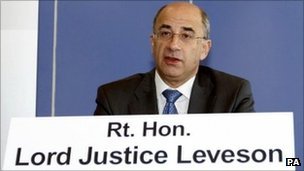 |
|
Lord
Justice Leveson's inquiry is sitting at the Royal Courts of
Justice in London |
The man in charge of the inquiry into the culture, practices and ethics
of the media faces a deadline of his own.
Lord Justice Leveson, who is due to resume his inquiry after the
Christmas break on Monday, is planning to publish his first report in
September.
That leaves him just nine months to conclude a sweeping review of the
press.
First, national newspaper editors and their staff will give evidence -
like all the witnesses - under oath.
Until now their ability to respond to criticism has been limited.
Inside the inquiry room barristers working for the papers have had
little chance to cross examine witnesses.
Outside, their coverage has been closely scrutinised.
When the Mail on Sunday accused Hugh Grant of making "mendacious smears"
against the paper it was obliged, in the end, to remove the comment from
the Mail website.
Now the editors of the Sun, the Daily Telegraph, the FT, the
Independent, the Daily Star, Mail on Sunday and the Daily Express will
be among those getting a say. The editor of the Daily Mail Paul Dacre
will give his evidence in February.
Regulation
The editors will have to make the case not just for the quality of their
journalism but for the state of their industry.
The prognosis so far has been bleak.
The Guardian editor Alan Rusbridger has described an "existential threat
to the idea and sustainability of journalism itself".
|
Should he
favour changes requiring a change in the law, the government
and ultimately Parliament will have to embrace or reject his
conclusions”
|
In the words of the former News of the World deputy editor Neil Wallis:
"The chosen newspaper of this country is the Sun and the red tops. The
Great British population do not want the broadsheets."
So Lord Justice Leveson has to consider how to deal with abuses by the
press without regulating away what remains of its profitability.
Something like three quarters of the evidence is yet to come.
Before the end of March the inquiry will also hear about the
relationship between police and journalists. After that it will look at
how press and politicians interact. Then it will consider the details of
regulation.
Behind the scenes the inquiry's lawyers are sifting hundreds of
submissions. Ninety three alleged victims of press mistreatment alone
have been in touch.
There are limits to this work. Lord Justice Leveson has said he will not
make "findings of fact" about the behaviour of any individual newspaper
or editor in any particular case in his report.
'More work'
But it would be naive to imagine this is a story about one man's final
conclusions. The impact of the Leveson Inquiry will be found not just in
his written recommendations, but in the hearings themselves.
There was little doubt - for example - that when Lord Justice Leveson
called three of the reporters who covered the disappearance of Madeleine
McCann for the Daily Express he intended to find out how their stories
were written.
The behaviour of this title in this case may not appear in his report,
but it was explored at length in front of the television cameras.
He has also made it clear that he wants to get to the bottom of who was
responsible for deleting the voicemail messages of the murdered
schoolgirl Milly Dowler, deletions that led her parents to wrongly
believe she was alive.
The Metropolitan Police have promised to provide more information to the
inquiry on that this month.
Once this report delivered, there will more work to come.
After criminal proceedings are complete Lord Justice Leveson will start
examining the extent of unlawful or improper conduct at News
International or other newspapers.
Should he favour changes requiring a change in the law, the government
and ultimately Parliament will have to embrace or reject his
conclusions.
While Lord Justice Leveson is determined to complete the current part of
his inquiry by the autumn, the final consequences of his deliberations
may not become apparent until much later |


